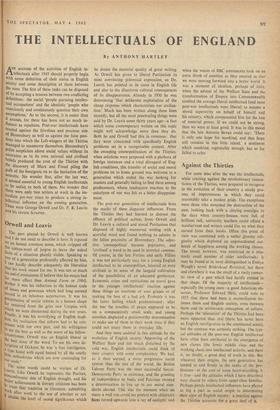THE INTELLECTUALS OF ENGLAND
By ANTHONY HARTLEY NY account of the activities of English in- tellectuals after 1945 should properly begin With some definition of their status in English society and some description of them between the wars. The first of these tasks can be disposed of by accepting a tension between two conflicting definitions: the social 'people pursuing intellec- tual occupations' and the idealistic 'people who consciously and continuously question their own assumptions.' As to the second, it is easier than it sounds, for there has been not so much in- fluence as repulsion. Post-war intellectuals have reacted against the frivolous and precious side of Bloomsbury as well as against the false posi- tions into which the Left-wingers of the Thirties Managed to manoeuvre themselves. Bloomsbury's Polite scepticism about social values without its assurance as to its own rational and civilised beliefs produced the rout of the Thirties with the discovery of Marx and Freud piling the guilt of the bourgeois on to the hesitation of the neurotic. No wonder that, after the last war, it seemed essential to young English intellectuals to be unfair to both of them. No wonder that there were only two writers at work in the im- mediate pre-war years to produce a strong in- tellectual influence on the coming generation. These were George Orwell and Dr. F. R. Leavis and his review Scrutiny.






































 Previous page
Previous page